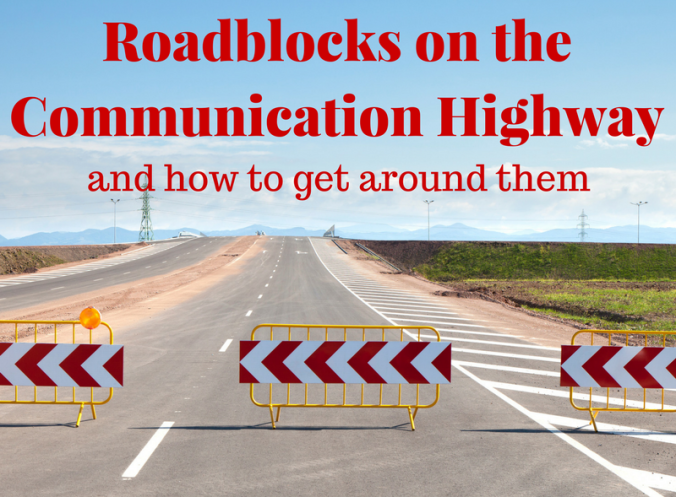 There are all kinds of roadblocks that can get in the way of effective communication. Part of being a skilled communicator is understanding what stands in your way and how to avoid or overcome it. Just because you’ve been reading this blog for months and are on your way to being a communications master doesn’t mean that communication can’t fail. After all, (unfortunately) everyone else may not be working on their communication skills.
There are all kinds of roadblocks that can get in the way of effective communication. Part of being a skilled communicator is understanding what stands in your way and how to avoid or overcome it. Just because you’ve been reading this blog for months and are on your way to being a communications master doesn’t mean that communication can’t fail. After all, (unfortunately) everyone else may not be working on their communication skills.
The art of communication is the language of leadership. James Humes
Ineffective communication leads to wasted time and money, confusion and misunderstanding – basically, a wreck on the communication highway. Here are a few roadblocks that you need to be aware of and prepared to avoid or overcome.
- Jargon. We all know people who insist on using long, complicated words or acronyms that are unfamiliar to almost everyone else. If your point is to understand each other, just don’t.
- Taboo. Some topics are simply off-limits. If their body language tells you the topic is taboo, switch gears.
You can change your world by changing your words… Remember, death and life are in the power of the tongue. Joel Osteen
- Lack of Attention / Distracted. If you can tell they aren’t focused when you need them to be, give them a minute. Go to bathroom or get something to drink. Still distracted? Change the subject and gain their interest then move back to your topic. If necessary, reschedule. Remember, you have no idea what’s going in their life. This may just be a bad time for the conversation.
- Perception & Viewpoint. You should be able to express an opinion that isn’t shared by your audience… and so should they. Speak carefully and listen carefully.
Until you have learned to be tolerant with those who do not always agree with you, you will be neither successful nor happy. Napoleon Hill
- Physical disabilities. Sometimes someone can’t hear you because they can’t hear you. Be aware of your surroundings and your audience and watch for non-verbal clues such as turning one ear toward you, leaning forward, or watching your mouth (lip reading).
- Lack of non-verbal communication. Keep in mind that if you aren’t face-to-face, your body language and facial expressions have lost all their effectiveness. Find a way to verbalize your thoughts and emotions.
- Culture. Social norms vary a great deal between cultures. Study up in advance.
America is a noisy culture, unlike, say, Finland, which values silence. Individualism, dominant in the U.S. and Germany, promotes the direct, fast-paced style of communication associated with extraversion. Collectivistic societies, such as those in East Asia, value privacy and restraint, qualities more characteristic of introverts. Laurie Helgoe
Here’s to a week full of productive, effective communication. I’ll leave you with this last valuable tip for the road…
There aren’t too many principles of proper business conduct with which just about everybody will agree. Two come to mind: 1. Unless you’re a professional athlete, don’t offer co-workers encouragement by patting them on the butt, and 2. Don’t burn bridges. Dale Dauten
As always, if we can help you get your messages across more effectively, in person or online, we’d love to help! Leave a comment here or on our webpage, and follow us on Facebook or Twitter.
Marie Mallory, Communication / PR Specialist, Irons Media Group